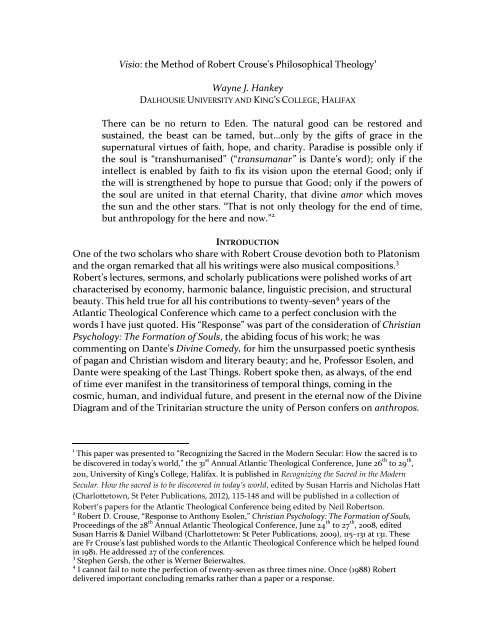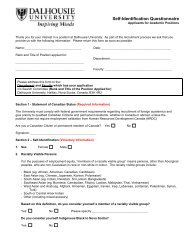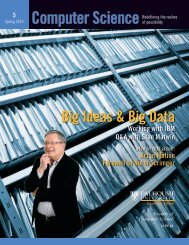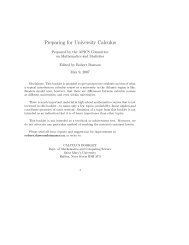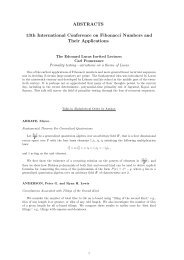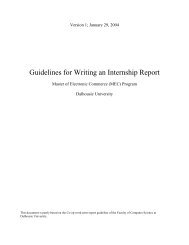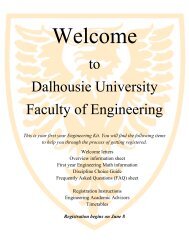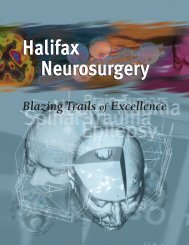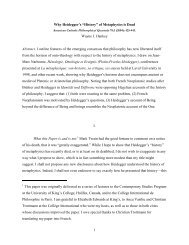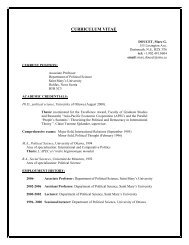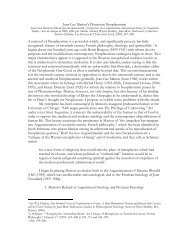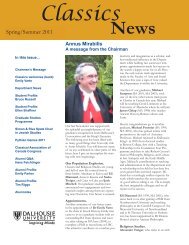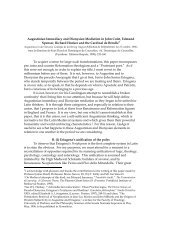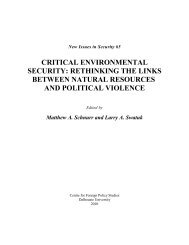Visio: the Method of Robert Crouse's Philosophical Theology
Visio: the Method of Robert Crouse's Philosophical Theology
Visio: the Method of Robert Crouse's Philosophical Theology
You also want an ePaper? Increase the reach of your titles
YUMPU automatically turns print PDFs into web optimized ePapers that Google loves.
<strong>Visio</strong>: <strong>the</strong> <strong>Method</strong> <strong>of</strong> <strong>Robert</strong> <strong>Crouse's</strong> <strong>Philosophical</strong> <strong>Theology</strong> 1<br />
Wayne J. Hankey<br />
DALHOUSIE UNIVERSITY AND KING’S COLLEGE, HALIFAX<br />
There can be no return to Eden. The natural good can be restored and<br />
sustained, <strong>the</strong> beast can be tamed, but…only by <strong>the</strong> gifts <strong>of</strong> grace in <strong>the</strong><br />
supernatural virtues <strong>of</strong> faith, hope, and charity. Paradise is possible only if<br />
<strong>the</strong> soul is “transhumanised” (“transumanar” is Dante’s word); only if <strong>the</strong><br />
intellect is enabled by faith to fix its vision upon <strong>the</strong> eternal Good; only if<br />
<strong>the</strong> will is streng<strong>the</strong>ned by hope to pursue that Good; only if <strong>the</strong> powers <strong>of</strong><br />
<strong>the</strong> soul are united in that eternal Charity, that divine amor which moves<br />
<strong>the</strong> sun and <strong>the</strong> o<strong>the</strong>r stars. “That is not only <strong>the</strong>ology for <strong>the</strong> end <strong>of</strong> time,<br />
but anthropology for <strong>the</strong> here and now.” 2<br />
INTRODUCTION<br />
One <strong>of</strong> <strong>the</strong> two scholars who share with <strong>Robert</strong> Crouse devotion both to Platonism<br />
and <strong>the</strong> organ remarked that all his writings were also musical compositions. 3<br />
<strong>Robert</strong>’s lectures, sermons, and scholarly publications were polished works <strong>of</strong> art<br />
characterised by economy, harmonic balance, linguistic precision, and structural<br />
beauty. This held true for all his contributions to twenty-seven 4 years <strong>of</strong> <strong>the</strong><br />
Atlantic Theological Conference which came to a perfect conclusion with <strong>the</strong><br />
words I have just quoted. His “Response” was part <strong>of</strong> <strong>the</strong> consideration <strong>of</strong> Christian<br />
Psychology: The Formation <strong>of</strong> Souls, <strong>the</strong> abiding focus <strong>of</strong> his work; he was<br />
commenting on Dante’s Divine Comedy, for him <strong>the</strong> unsurpassed poetic syn<strong>the</strong>sis<br />
<strong>of</strong> pagan and Christian wisdom and literary beauty; and he, Pr<strong>of</strong>essor Esolen, and<br />
Dante were speaking <strong>of</strong> <strong>the</strong> Last Things. <strong>Robert</strong> spoke <strong>the</strong>n, as always, <strong>of</strong> <strong>the</strong> end<br />
<strong>of</strong> time ever manifest in <strong>the</strong> transitoriness <strong>of</strong> temporal things, coming in <strong>the</strong><br />
cosmic, human, and individual future, and present in <strong>the</strong> eternal now <strong>of</strong> <strong>the</strong> Divine<br />
Diagram and <strong>of</strong> <strong>the</strong> Trinitarian structure <strong>the</strong> unity <strong>of</strong> Person confers on anthropos.<br />
1 This paper was presented to “Recognizing <strong>the</strong> Sacred in <strong>the</strong> Modern Secular: How <strong>the</strong> sacred is to<br />
be discovered in today’s world,” <strong>the</strong> 31 st Annual Atlantic Theological Conference, June 26 th to 29 th ,<br />
2011, University <strong>of</strong> King’s College, Halifax. It is published in Recognizing <strong>the</strong> Sacred in <strong>the</strong> Modern<br />
Secular. How <strong>the</strong> sacred is to be discovered in today’s world, edited by Susan Harris and Nicholas Hatt<br />
(Charlottetown, St Peter Publications, 2012), 115-148 and will be published in a collection <strong>of</strong><br />
<strong>Robert</strong>’s papers for <strong>the</strong> Atlantic Theological Conference being edited by Neil <strong>Robert</strong>son.<br />
2 <strong>Robert</strong> D. Crouse, “Response to Anthony Esolen,” Christian Psychology: The Formation <strong>of</strong> Souls,<br />
Proceedings <strong>of</strong> <strong>the</strong> 28 th Annual Atlantic Theological Conference, June 24 th to 27 th , 2008, edited<br />
Susan Harris & Daniel Wilband (Charlottetown: St Peter Publications, 2009), 115–131 at 131. These<br />
are Fr Crouse’s last published words to <strong>the</strong> Atlantic Theological Conference which he helped found<br />
in 1981. He addressed 27 <strong>of</strong> <strong>the</strong> conferences.<br />
3 Stephen Gersh, <strong>the</strong> o<strong>the</strong>r is Werner Beierwaltes.<br />
4 I cannot fail to note <strong>the</strong> perfection <strong>of</strong> twenty-seven as three times nine. Once (1988) <strong>Robert</strong><br />
delivered important concluding remarks ra<strong>the</strong>r than a paper or a response.
2<br />
The Conference has begun to take a new direction in <strong>the</strong> recent meetings at<br />
which <strong>Robert</strong> was not present. 5 However, <strong>the</strong> conclusion, which his response gave<br />
to <strong>the</strong> past he had fundamentally shaped, invites and enables us to consider what<br />
has been accomplished. I undertake this because thirty years <strong>of</strong> a conference with<br />
published reports is an astonishing accomplishment unmatched in Canada which<br />
compels celebration, and because, by celebrating this, we see something <strong>of</strong> <strong>the</strong><br />
scope and unchanging character <strong>of</strong> <strong>Robert</strong>’s <strong>the</strong>ological work. However, <strong>the</strong>re is<br />
ano<strong>the</strong>r reason to outline <strong>the</strong> history. Through <strong>the</strong> course <strong>of</strong> <strong>the</strong> conferences<br />
<strong>Robert</strong>’s judgment on a most important and timely matter does change, and I must<br />
speak about that in <strong>the</strong> concluding part <strong>of</strong> this paper. After my sketch <strong>of</strong> our<br />
history, I shall speak first <strong>of</strong> what Fr Crouse taught in his <strong>the</strong>ological papers, <strong>the</strong>n<br />
<strong>of</strong> his method, and finally <strong>of</strong> what changed for him in <strong>the</strong> course <strong>of</strong> <strong>the</strong> three<br />
decades which his contributions spanned.<br />
It seems to me that <strong>the</strong> Conference has gone through three phases, which I<br />
shall name “Anglican”, “Western Christian”, and “Eschatological”, and is now<br />
moving into ano<strong>the</strong>r phase, one which reflects <strong>the</strong> diminution <strong>of</strong> Anglicanism and<br />
Western Christianity in Atlantic Canada, and <strong>the</strong> growth <strong>of</strong> Eastern Christianity,<br />
Islam, Buddhism, and secularity here, and <strong>the</strong> power <strong>of</strong> non Christian religions and<br />
cultures globally. I shall follow <strong>the</strong> 2004 Conference by calling this new phase<br />
“Multicultural”. The completed phases approximately correspond to <strong>the</strong> three<br />
decades <strong>of</strong> its working: <strong>the</strong> 1980s, <strong>the</strong> 1990s, and <strong>the</strong> first ten years <strong>of</strong> <strong>the</strong> new<br />
millennium.<br />
Although <strong>the</strong> Anglican phase began with a conference on “A Need for a<br />
Catholic Voice in <strong>the</strong> Church Today” and drew only on local talent, it immediately<br />
established three characteristics which have abided. First, despite <strong>the</strong> title and<br />
location, St Peter’s Ca<strong>the</strong>dral, Charlottetown, founded to be and continuing as <strong>the</strong><br />
Tractarian lighthouse in <strong>the</strong> Anglican Diocese <strong>of</strong> Nova Scotia and Prince Edward<br />
Island, it was not a party affair. The first speaker was <strong>the</strong> strongest Evangelical<br />
Anglican voice in Atlantic Canada, Dr R.A. Ward, and he preached on <strong>the</strong> necessity<br />
<strong>of</strong> <strong>the</strong> atonement as divine propitiation. Later Dr Ward would be succeeded by<br />
leading English, American, Swedish, and Australian Evangelical <strong>the</strong>ologians. 6<br />
Second, and in accord with this, we were engaged in a process <strong>of</strong> self-education.<br />
More stunning even than <strong>the</strong> increasingly distinguished <strong>the</strong>ologians, scholars, and<br />
church leaders from ever more distant parts which <strong>the</strong> Conference attracted was<br />
<strong>the</strong> extraordinary learning undertaken by those educated here. I cannot fail to<br />
5 The 2004 and 2009 conferences considered Judaism and Islam alongside Christianity both<br />
historically and in relation to present actuality, see Multiculturalism and Religious Freedom,<br />
Proceedings <strong>of</strong> <strong>the</strong> 24 th Annual Atlantic Theological Conference, Fredericton, June 27th to 30 th ,<br />
2004, edited Susan Harris (Charlottetown: St. Peter Publications, 2005) and Changing our Mind on<br />
Secularization. The Contemporary Debate about Secular and Sacred in Judaism, Christianity and<br />
Islam, Proceedings <strong>of</strong> <strong>the</strong> 29 th Annual Atlantic Theological Conference Charlottetown, June 23 rd to<br />
26 th , 2009, edited Wayne J. Hankey & Nicholas Hatt, both online and printed (Charlottetown: St<br />
Peter Publications, 2010).<br />
6 Most notably, but not exclusively: Dr Roger Beckwith, Dr Philip Hughes, Bishop FitzSimons<br />
Allison, Dr James I. Packer, and Bishop E. Donald Cameron.
3<br />
mention David Curry’s work on <strong>the</strong> lectionary which is unequalled in <strong>the</strong> Anglican<br />
world, but this is only indicative. 7 Canon law, scriptural interpretation, literature,<br />
<strong>the</strong> history <strong>of</strong> doctrine, church history, liturgy, iconography, all <strong>the</strong>se, and more,<br />
drew devoted and careful labour. Third, <strong>the</strong> work was equally <strong>the</strong>oretical and<br />
spiritual. Development <strong>of</strong> <strong>the</strong> life <strong>of</strong> prayer, and growth in charity, went with selfeducation,<br />
for <strong>the</strong> sake <strong>of</strong> building religious community. For me <strong>the</strong> moment<br />
which most revealed how knowledge and charity were growing in us<br />
simultaneously was Fr Crouse’s sermon at <strong>the</strong> 1985 conference on “The Prayer<br />
Book.” From <strong>the</strong> pulpit <strong>of</strong> St Peter’s Ca<strong>the</strong>dral during High Mass in <strong>the</strong> presence <strong>of</strong><br />
<strong>the</strong> Warden <strong>of</strong> Latimer House, Oxford, that Evangelical epicentre, he preached on<br />
“The Eucharistic Doctrine in <strong>the</strong> Prayer Book.” Using <strong>the</strong> copy <strong>of</strong> Cranmer’s works<br />
formerly owned by <strong>the</strong> first Rector <strong>of</strong> St Peter’s, employing no o<strong>the</strong>r words than<br />
Cranmer’s, and to his own joyful astonishment as much as to that <strong>of</strong> his hearers,<br />
<strong>Robert</strong> exhibited a doctrine which was undeniably Catholic.<br />
For <strong>the</strong> first decade <strong>of</strong> this Conference, all this work, learning, thought, and<br />
spiritual growth were dedicated to reconstructing <strong>the</strong> basis <strong>of</strong> <strong>the</strong> Anglican Church<br />
through revivifying its forms in <strong>the</strong> face <strong>of</strong> contemporary criticism and problems. I<br />
am not afraid to say that nothing nearly equal to this was enterprised elsewhere in<br />
<strong>the</strong> two hundred years since <strong>the</strong> party divisions within Anglicanism became fixed.<br />
Moreover, <strong>the</strong>oretically at least, <strong>the</strong> effort was successful. Why it failed to arrest<br />
<strong>the</strong> self-destruction <strong>of</strong> <strong>the</strong> Anglican Communion, Fr Crouse explained to us<br />
repeatedly, and to that we shall turn in due course, but, now I must say something<br />
about <strong>the</strong> o<strong>the</strong>r two phases.<br />
After <strong>the</strong> Conference dealt with essentials <strong>of</strong> institutional Anglicanism:<br />
initiation (1982), ecclesiastical polity (1984), <strong>the</strong> Prayer Book (1985), <strong>the</strong> Lambeth<br />
Quadrilateral (1987), <strong>the</strong> interpretation <strong>of</strong> Scripture (1988), <strong>the</strong> Thirty-nine Articles<br />
(1989), <strong>the</strong> doctrines <strong>of</strong> atonement and sacrifice (1990), a second phase emerged.<br />
Its concern was larger than Anglicanism; it expanded to consider problems before<br />
Western Christianity as a whole: <strong>the</strong> environment, tradition and <strong>the</strong> development<br />
<strong>of</strong> doctrine, <strong>the</strong> challenge <strong>of</strong> secularity, anthropology, reformation and reform, <strong>the</strong><br />
person <strong>of</strong> Christ, political <strong>the</strong>ology, ordination, iconography. In <strong>the</strong> course <strong>of</strong><br />
<strong>the</strong>se, <strong>Robert</strong>’s papers changed <strong>the</strong>ir tone in a way so strikingly exhibited in his<br />
words with which I began, and with which he ended his speaking to us. Sometimes<br />
this was because <strong>of</strong> <strong>the</strong> topics adopted by <strong>the</strong> Conference in <strong>the</strong> new millennium:<br />
Christ as Alpha and Omega (2000), <strong>the</strong> Journey home (2001), Providence (2002),<br />
and that to which we are being led, friendship with God and one ano<strong>the</strong>r (2005).<br />
Because <strong>of</strong> this direction in <strong>the</strong> topics, I name this phase <strong>of</strong> <strong>the</strong> Conference,<br />
Eschatological. But <strong>the</strong>re is ano<strong>the</strong>r reason <strong>Robert</strong>’s papers, both in <strong>the</strong> meetings<br />
devoted to <strong>the</strong>se topics, and in o<strong>the</strong>rs beginning already in <strong>the</strong> 1990s, turned to<br />
teaching us how to live in end times, how to live, as <strong>the</strong> first Christians did, in <strong>the</strong><br />
7 David P. Curry, “Doctrinal Instrument <strong>of</strong> Salvation: The Use <strong>of</strong> Scripture in <strong>the</strong> Prayer Book<br />
Lectionary,” The Prayer Book, A Theological Conference held at St. Peter’s Ca<strong>the</strong>dral Charlottetown,<br />
P.E.I., June 25 th -28 th , 1985, edited G. Richmond Bridge (Charlottetown: St. Peter Publications, 1986),<br />
29–70.
consciousness that <strong>the</strong> end was at hand. As striking as his Catholic sermon drawn<br />
from Archbishop Cranmer was <strong>the</strong> judgment he delivered in 1993:<br />
4<br />
[I]n current Anglicanism,…<strong>the</strong> Church in process <strong>of</strong> disintegration as an<br />
institution, pr<strong>of</strong>esses liberality while actually becoming ever more<br />
insistently bureaucratic, imposing on reluctant but still respectful<br />
congregations <strong>the</strong> banal fabrications <strong>of</strong> impoverished imagination. In all<br />
this, Christian memory (and <strong>the</strong>refore Christian faith and understanding)<br />
must be <strong>the</strong> victim. 8<br />
This judgment is <strong>the</strong> center <strong>of</strong> <strong>the</strong> turn in <strong>Robert</strong>’s thought which I shall treat in<br />
<strong>the</strong> last part <strong>of</strong> this paper. Now, however, we consider what did not change.<br />
ETERNAL FORMS<br />
It is both obvious to Christian faith, and demonstrable to understanding,<br />
that <strong>the</strong> authority <strong>of</strong> God is absolute. “Authority”, as <strong>the</strong> etymology <strong>of</strong> <strong>the</strong><br />
word itself suggests, refers to <strong>the</strong> defining and directing power in an author<br />
or originator. The idea <strong>of</strong> <strong>the</strong> absolute authority <strong>of</strong> God is thus implicit in<br />
<strong>the</strong> very notion <strong>of</strong> God as <strong>the</strong> almighty and eternal source and author <strong>of</strong> all<br />
that is, who governs all things by an indefectible providence… 9<br />
Thus, Fr Crouse in 1984, what follows he gave us in 2002.<br />
The Fa<strong>the</strong>rs <strong>of</strong> <strong>the</strong> Church discerned <strong>the</strong> doctrine <strong>of</strong> God’s providence not<br />
only in <strong>the</strong> Holy Scriptures <strong>of</strong> <strong>the</strong> Old and New Testaments, but also in <strong>the</strong><br />
speculative and scientific <strong>the</strong>ology <strong>of</strong> <strong>the</strong> Greek philosophers. They saw it<br />
not only as a fundamental tenet <strong>of</strong> religious faith, divinely revealed, but also<br />
as a necessary postulate <strong>of</strong> any rational thought about God, <strong>the</strong> world and<br />
human destiny. That meeting <strong>of</strong> faith and <strong>the</strong>ological science which so<br />
characterised patristic thought in this and so many o<strong>the</strong>r matters, was<br />
already present, <strong>of</strong> course, in <strong>the</strong> Scriptures, perhaps most strikingly in <strong>the</strong><br />
Wisdom Literature, in <strong>the</strong> vision <strong>of</strong> <strong>the</strong> transcendent divine wisdom<br />
ordering all things “strongly and sweetly”.<br />
In <strong>the</strong> tradition <strong>of</strong> Platonic <strong>the</strong>ology, especially, from <strong>the</strong> time <strong>of</strong> Plato<br />
himself, through <strong>the</strong> Middle Platonists and Neoplatonists to that last great<br />
Neoplatonic <strong>the</strong>ologian, Proclus…, <strong>the</strong> doctrine <strong>of</strong> God’s providence was<br />
always a primary consideration. “God”, says <strong>the</strong> A<strong>the</strong>nian stranger in Plato’s<br />
8 <strong>Robert</strong> D. Crouse, “Tradition and Renewal,” Tradition: Received and Handed On, Proceedings <strong>of</strong><br />
<strong>the</strong> 1993 Atlantic Theological Conference, 27 th June-1 st July, 1993, edited D. A. Petley (Charlottetown:<br />
St. Peter Publications, 1994), 90–98 at 94.<br />
9 <strong>Robert</strong> D. Crouse, “The Prayer Book and <strong>the</strong> Authority <strong>of</strong> Tradition,” Church Polity and Authority,<br />
Proceedings <strong>of</strong> a Theological Conference held at <strong>the</strong> University <strong>of</strong> King’s College, Halifax, Nova<br />
Scotia, May 27 th -31st, 1984, edited G. Richmond Bridge (Charlottetown: St. Peter Publications,<br />
1985), 53–61 at 53.
5<br />
Laws, “as <strong>the</strong> old tradition declares, holding in his hand <strong>the</strong> beginning,<br />
middle and end <strong>of</strong> all that is, travels, according to his nature, in a straight<br />
line towards <strong>the</strong> accomplishment <strong>of</strong> his end. Justice always accompanies<br />
him, and is <strong>the</strong> punisher <strong>of</strong> those who fall short <strong>of</strong> <strong>the</strong> divine law.” 10<br />
“Fur<strong>the</strong>rmore,” explains <strong>the</strong> stranger, “it would be false and impious to<br />
suppose that God’s providence could be neglectful <strong>of</strong> even <strong>the</strong> smallest<br />
things.” 11 According to Plato’s doctrine, <strong>the</strong> divine providence is allknowing,<br />
all-powerful, unchanging and absolutely good. 12 But also in Plato’s<br />
dialogues, all <strong>the</strong> difficulties <strong>of</strong> such a doctrine, and <strong>of</strong> <strong>the</strong> correlative<br />
conception <strong>of</strong> predestination, are raised and discussed. 13<br />
The greatest <strong>of</strong> <strong>the</strong> many pleasures <strong>of</strong> reading our master’s <strong>the</strong>ological<br />
papers is <strong>the</strong>se authoritative revelations <strong>of</strong> <strong>the</strong> eternal forms which come out <strong>of</strong> <strong>the</strong><br />
humble study, obedient prayer, and contemplative silence <strong>of</strong> his life. I shall say<br />
something about what characterises his disclosures <strong>of</strong> <strong>the</strong> changeless ideas in <strong>the</strong><br />
Divine Mind, but before doing so, I must quote one more, because <strong>the</strong>ir<br />
astonishing freshness comes out strikingly in it. Here, for <strong>the</strong> conference on “Holy<br />
Living: Christian Morality Today”, Fr Crouse is discussing reconciliation. He opens<br />
by declaring it to be “<strong>the</strong> beginning, and <strong>the</strong> end, and <strong>the</strong> whole meaning <strong>of</strong><br />
Christian life.” He goes on:<br />
In a fundamental sense…, <strong>the</strong> ministry <strong>of</strong> reconciliation is finished. Our<br />
reconciliation has been accomplished, once for all; for Christ’s sake, we are<br />
accounted friends <strong>of</strong> God, and God accounts us so, so we are. We are<br />
reconciled… But, in ano<strong>the</strong>r sense, our reconciliation is not complete, until<br />
our life <strong>of</strong> friendship, our life <strong>of</strong> charity, is finally fulfilled in <strong>the</strong> perfect<br />
knowledge and <strong>the</strong> perfect love <strong>of</strong> God; until, finally, we shall know as we<br />
are known. Friendship is not, after all, some static, finished thing, but a<br />
condition and a context in which we grow….Reconciliation includes…our<br />
beginning and our growth in friendship. And it includes, as well, that unity<br />
<strong>of</strong> spirit which is <strong>the</strong> aim and end <strong>of</strong> friendship; so reconciliation is <strong>the</strong> very<br />
life <strong>of</strong> heaven….It is in that perspective <strong>of</strong> divine and human friendship that<br />
we must consider <strong>the</strong> questions <strong>of</strong> Christian morality… 14<br />
10 Plato, Laws, IV, 718 [note RDC].<br />
11 Ibid., X, 902 [note RDC].<br />
12 Ibid., X, 901 [note RDC]<br />
13 <strong>Robert</strong> D. Crouse, “The Doctrine <strong>of</strong> Providence in Patristic and Medieval <strong>Theology</strong>,” Providence:<br />
<strong>the</strong> Will <strong>of</strong> God in Human Affairs, Papers delivered at <strong>the</strong> Twenty-Second Annual Atlantic<br />
Theological Conference, June 23 rd to 26th, 2002, University <strong>of</strong> King’s College, Halifax, Nova Scotia,<br />
edited Susan Harris (Charlottetown: St. Peter Publications, 2003), 27–37 at 27.<br />
14 <strong>Robert</strong> D. Crouse, “The Ministry <strong>of</strong> Reconciliation: Anglican Approaches,” Holy Living: Christian<br />
Morality Today, A Theological Conference held at <strong>the</strong> University <strong>of</strong> King’s College, Halifax, Nova<br />
Scotia, May 20th-23 rd , 1986, edited G. Richmond Bridge (Charlottetown: St. Peter Publications,<br />
1987), 50–58 at 50–51.
6<br />
Morality is to be seen in <strong>the</strong> context <strong>of</strong> divine and human friendship, <strong>the</strong> life <strong>of</strong><br />
heaven! What paradisal freshness, old things, indeed, eternal things, made new.<br />
Would that my task this evening might be exhausted by reading <strong>Robert</strong>’s<br />
texts to you and sharing my delight in <strong>the</strong>m! However, this is a <strong>the</strong>ological<br />
conference and we are set to drudgery divine, so I must <strong>of</strong>fer analysis. Let us<br />
consider some characteristics <strong>of</strong> his <strong>the</strong>ology, present from <strong>the</strong> beginning <strong>of</strong> his<br />
papers for <strong>the</strong> Conference, and abiding until <strong>the</strong> end.<br />
First, <strong>the</strong>ology is a participation in God’s knowledge. At <strong>the</strong> initial meeting<br />
<strong>of</strong> <strong>the</strong> Conference, <strong>Robert</strong> defined it:<br />
In <strong>the</strong> first place, <strong>the</strong>ology is God’s own knowledge—that eternal and<br />
perfect knowledge by which God knows himself and all his creatures. In <strong>the</strong><br />
second place, it is our imperfect sharing in that divine knowledge. 15<br />
Because God created all things according to <strong>the</strong> words, forms, or ideas he thinks or<br />
speaks in his Son, <strong>the</strong>se eternal essences are known both to philosophical<br />
reflection as well as to what is given by inspiration. The Jewish and Christian holy<br />
scriptures are sources <strong>of</strong> <strong>the</strong>ology, but its nature forbids that <strong>the</strong>y be its only loci.<br />
Indeed, just <strong>the</strong> opposite. The title <strong>of</strong> <strong>Robert</strong>’s first paper to <strong>the</strong> Conferences, on<br />
“Dogmatic <strong>Theology</strong> in <strong>the</strong> Church Today” proclaimed, quoting St Vincent <strong>of</strong><br />
Lerins [Commonitorium, ii], that <strong>the</strong>ology concerned “Quod ubique, quod semper,<br />
quod ab omnibus”. Thus, <strong>the</strong> test <strong>of</strong> <strong>the</strong>ology’s “au<strong>the</strong>nticity is its catholicity, or<br />
universality; as <strong>the</strong> Vincentian Canon puts it, “Quod ubique, quod semper, quod ab<br />
omnibus creditum est”; “what is believed everywhere, always and by everyone.” 16 Of<br />
necessity, Fr Crouse discerned <strong>the</strong> changeless ideas which constitute <strong>the</strong> substance<br />
<strong>of</strong> <strong>the</strong>ology both in pagan and in Jewish and Christian sources. Thus, any <strong>of</strong> his<br />
papers might equally start from ei<strong>the</strong>r <strong>the</strong> scriptural or <strong>the</strong> pagan side. Indeed, he<br />
judged <strong>the</strong> unification <strong>of</strong> <strong>the</strong> two to be essential to <strong>the</strong>ology. Scripture itself, <strong>the</strong><br />
pagan <strong>the</strong>ologians, <strong>the</strong> Church Fa<strong>the</strong>rs, and <strong>the</strong> Mediaeval Doctors united inspired<br />
and philosophical knowledge. 17 He followed <strong>the</strong>m.<br />
Second, <strong>the</strong> given is a simple logos or ratio, an intelligible structure.<br />
However, just as <strong>the</strong>se divine words are received by humans in intellectual<br />
intuition, in philosophical reflection, and by inspiration, and are only properly<br />
15 <strong>Robert</strong> D. Crouse, “Quod Ubique, Quod Semper, Quod ab Omnibus: Dogmatic <strong>Theology</strong> in <strong>the</strong><br />
Church Today,” Conference Report: A Need for a Catholic Voice in <strong>the</strong> Church Today (Charlottetown:<br />
St. Peter Publications, 1981), 11–16 at 11.<br />
16 Ibid.<br />
17 So, for example: “St. Thomas’ position involves a remarkable conflation <strong>of</strong> <strong>the</strong> doctrine <strong>of</strong><br />
Aristotle’s Nicomachean Ethics with <strong>the</strong> Augustinian <strong>the</strong>ology <strong>of</strong> grace. Aristotle’s conception <strong>of</strong><br />
love (philia) as including all <strong>the</strong> virtues serves as a paradigm for Thomas’ doctrine <strong>of</strong> charity, which,<br />
he says, is a certain friendship between man and God, whereby man loves God and God loves<br />
man…” <strong>Robert</strong> D. Crouse, “The Development <strong>of</strong> <strong>the</strong> Doctrine <strong>of</strong> Sin and Grace from Augustine to<br />
Anselm,” The Journey Home: Sin and Grace, Papers delivered at <strong>the</strong> 2001 Atlantic Theological<br />
Conference, St Peter’s Ca<strong>the</strong>dral, Charlottetown, Prince Edward Island, edited Susan Harris<br />
(Charlottetown: St. Peter Publications, 2002), 37–46 at 44.
7<br />
understood when <strong>the</strong>se modes are united or reconciled, so also <strong>the</strong>y manifest<br />
<strong>the</strong>mselves as a balance, or harmony, <strong>of</strong> elements, and to each idea <strong>the</strong>re is a<br />
proper problematic. Though <strong>the</strong> divine words are simple and changeless in<br />
<strong>the</strong>mselves, time, and <strong>the</strong> mode <strong>of</strong> human knowing, positively explicate, or reveal,<br />
<strong>the</strong>ir inner structure. This articulation enables <strong>the</strong> mutual reciprocity and<br />
harmony, <strong>the</strong> friendship <strong>of</strong> <strong>the</strong> elements, to appear; so time is <strong>the</strong> medium <strong>of</strong> glory<br />
or <strong>the</strong>ophany. In distinct temporal epochs, <strong>the</strong> ideas are articulated differently,<br />
but, although none exhaust <strong>the</strong> forms, for humble loving vision, <strong>the</strong> fundamental<br />
logic can always manifest itself, and it does so beautifully. <strong>Robert</strong> gave a splendid<br />
example from sculpture. He started with “a massive bronze font, dating from 1225,<br />
in <strong>the</strong> Ca<strong>the</strong>dral at Hildesheim”:<br />
The font rests upon four figures, representations <strong>of</strong> <strong>the</strong> four rivers <strong>of</strong> Eden,<br />
symbolizing…<strong>the</strong> four cardinal virtues; and rising from that base are<br />
representations <strong>of</strong> <strong>the</strong> works <strong>of</strong> redemption, <strong>of</strong> grace and mercy. The<br />
iconography is complex, but <strong>the</strong> main point is clear: grace presupposes<br />
nature and builds upon it. The o<strong>the</strong>r illustration, also from <strong>the</strong> thirteenth<br />
century, probably about 1270, is in <strong>the</strong> Church <strong>of</strong> San Giovanni<br />
Fuorcivitas…in Tuscany. It is a holy water stoup, carved in stone…Around<br />
<strong>the</strong> bowl, Giovanni Pisano has carved representations <strong>of</strong> <strong>the</strong> cardinal<br />
virtues; and, on <strong>the</strong> shaft supporting <strong>the</strong> bowl, <strong>the</strong> three <strong>the</strong>ological virtues:<br />
faith, hope and charity. The message is clear: grace sustains nature; nature<br />
depends upon grace for its restoration and fulfilment. Both, I think are<br />
right; toge<strong>the</strong>r <strong>the</strong>y seem a marvellous illustration <strong>of</strong> <strong>the</strong> dialectical<br />
interplay <strong>of</strong> grace and nature in <strong>the</strong> life <strong>of</strong> virtue. 18<br />
Despite <strong>the</strong> ravages <strong>of</strong> polemic, patient contemplation can discern <strong>the</strong><br />
mutual implication between justification and sanctification as two sides <strong>of</strong> one<br />
simultaneous activity. Purged illumination finds St Paul, St Augustine, <strong>the</strong> Council<br />
<strong>of</strong> Orange, St Anselm, St Thomas Aquinas, Martin Lu<strong>the</strong>r, John Calvin, Thomas<br />
Cranmer, Richard Hooker, and <strong>the</strong> Council <strong>of</strong> Trent in agreement and Fr Crouse<br />
sums up <strong>the</strong> consensus fidelium with <strong>the</strong> words <strong>of</strong> <strong>the</strong> Council:<br />
Trent, also following St Augustine, declines to allow a division between<br />
justification and sanctification: “Justification is not only remission <strong>of</strong> sins,<br />
but sanctification and renovation <strong>of</strong> <strong>the</strong> inner man through <strong>the</strong> voluntary<br />
reception <strong>of</strong> grace and gifts, whence man becomes just from unjust, and<br />
18 <strong>Robert</strong> D. Crouse, “Hope Among <strong>the</strong> Virtues,” I am <strong>the</strong> Alpha and <strong>the</strong> Omega: Jesus for a New<br />
Millennium, Papers delivered at <strong>the</strong> 2000 Atlantic Theological Conference, Christ Church<br />
Ca<strong>the</strong>dral, Fredericton, New Brunswick, edited Susan Harris (Charlottetown: St. Peter Publications,<br />
2002), 66–74 at 72.
8<br />
friend from enemy, that he might be heir according to <strong>the</strong> hope <strong>of</strong> life<br />
eternal.” (Tit. 8,7) 19<br />
It is important for <strong>Robert</strong>’s vision <strong>of</strong> time without history that <strong>the</strong> Anglican<br />
reformation held to <strong>the</strong> simultaneity <strong>of</strong> imputed and communicated righteousness<br />
because Archbishop Cranmer followed Augustine mediated through Peter<br />
Lombard and <strong>the</strong> Glossa ordinaria. And thus, Cranmer and Aquinas use <strong>the</strong> same<br />
doctrinal formula. 20 Again and again, it will turn out that, for Fr Crouse, Anglicans<br />
can joyfully and securely follow <strong>the</strong>ir liturgical and spiritual tradition because <strong>the</strong>y<br />
preserve <strong>the</strong> essential connection with <strong>the</strong> Fa<strong>the</strong>rs and Scripture by way <strong>of</strong><br />
continuity with <strong>the</strong> Mediaeval Doctors.<br />
Third, however, <strong>the</strong>re is ano<strong>the</strong>r side. Time and human ratiocination also<br />
negatively allow <strong>the</strong> elements <strong>of</strong> <strong>the</strong> simple divine words to be broken up, so that<br />
<strong>the</strong>ir balanced structure and harmony is no longer seen. We forget, and <strong>the</strong> loss <strong>of</strong><br />
memory is <strong>the</strong> loss <strong>of</strong> <strong>the</strong> proper human good. Weakness, evil, and sin belong to it.<br />
Repeatedly <strong>Robert</strong> reminded us <strong>of</strong> <strong>the</strong> disintegration which was contemporary<br />
with <strong>the</strong> greatest symphony uniting all <strong>the</strong> elements <strong>of</strong> Western Christian culture,<br />
Dante’s Divine Comedy. So, for example, when treating sin and grace, he spoke <strong>of</strong><br />
Beatrice as representing “<strong>the</strong> unity <strong>of</strong> earthly and heavenly loves, <strong>the</strong> charity which<br />
is <strong>the</strong> gift <strong>of</strong> grace”, and <strong>the</strong>n went on:<br />
Dante, however, with his understanding <strong>of</strong> sin and grace in terms <strong>of</strong> <strong>the</strong><br />
Augustinian-Aristotelian-Thomistic doctrine <strong>of</strong> love, represents <strong>the</strong> end <strong>of</strong><br />
an era. Francesco Petrarca, his younger contemporary, can find no possible<br />
coherence between earthly and heavenly loves, and is tortured by <strong>the</strong><br />
contradiction; Boccaccio…does not even strive in that direction. For<br />
William Occam…<strong>the</strong>re can be no coherence <strong>of</strong> nature and grace, because<br />
<strong>the</strong> absolute freedom <strong>of</strong> <strong>the</strong> divine will in no way substantiated any natural<br />
good. 21<br />
A year later, Fr Crouse again exhibited for us <strong>the</strong> accord <strong>of</strong> divine<br />
predestination and human freedom in terms <strong>of</strong> <strong>the</strong> Comedy, and its breakdown<br />
among contemporaries <strong>of</strong> Dante, in much <strong>the</strong> same terms. 22 During <strong>the</strong><br />
Conference on Christian Anthropology, he showed what was, for him, <strong>the</strong> crucial<br />
19 <strong>Robert</strong> D. Crouse, “Justification and Sanctification in <strong>the</strong> Thought <strong>of</strong> St Paul and St Augustine,”<br />
Justification and Sanctification, Papers delivered at <strong>the</strong> Twenty-Seventh Annual Atlantic<br />
Theological Conference, May 29 th to June 1 st , 2007, Christ Church Ca<strong>the</strong>dral, Fredericton, New<br />
Brunswick, edited Susan Harris (Charlottetown: St. Peter Publications, 2008), 1–10 at 9. He is<br />
quoting Denzinger’s Enchiridion, 31 st ed., § 799, p. 287.<br />
20 Ibid., 8–9.<br />
21 <strong>Robert</strong> D. Crouse, “The Development <strong>of</strong> <strong>the</strong> Doctrine <strong>of</strong> Sin and Grace from Augustine to<br />
Anselm,” The Journey Home: Sin and Grace, Papers delivered at <strong>the</strong> 2001 Atlantic Theological<br />
Conference, St Peter’s Ca<strong>the</strong>dral, Charlottetown, Prince Edward Island, edited Susan Harris<br />
(Charlottetown: St. Peter Publications, 2002), 37–46 at 45.<br />
22 Crouse, “The Doctrine <strong>of</strong> Providence in Patristic and Medieval <strong>Theology</strong>,” 36–37.
unity in distinction both for God and <strong>the</strong> human, that <strong>of</strong> intellect and love in <strong>the</strong><br />
“Trinitarian paradigm”, as set out by Dante, He went on to trace its dislocation:<br />
9<br />
If we find in <strong>the</strong> poetry <strong>of</strong> Dante <strong>the</strong> most finished expression <strong>of</strong> <strong>the</strong><br />
Christian anthropology <strong>of</strong> <strong>the</strong> High Middle Ages, we must also recognize<br />
that, even as he was writing <strong>the</strong> Comedy, powerful movements were afoot,<br />
opening up radically new and different directions <strong>of</strong> thought about human<br />
nature and destiny….Duns Scotus, William Occam, Meister Eckhart,<br />
Francesco Petrarca [were] all…heralds <strong>of</strong> radically new ways <strong>of</strong> thinking….<br />
One thinks <strong>of</strong> Duns Scotus’ insistence upon <strong>the</strong> haecceitas, <strong>the</strong> “thisness”,<br />
<strong>the</strong> absolutely irreducible individuality <strong>of</strong> each existing thing; one thinks <strong>of</strong><br />
Eckhart’s focussing upon <strong>the</strong> absolute unitary ground <strong>of</strong> <strong>the</strong> self; one thinks<br />
<strong>of</strong> <strong>the</strong> voluntarism (<strong>the</strong> doctrine <strong>of</strong> <strong>the</strong> priority <strong>of</strong> <strong>the</strong> will) in Scotus and<br />
Occam; but perhaps most anti<strong>the</strong>tical to <strong>the</strong> whole Augustinian and<br />
Medieval tradition in anthropology was <strong>the</strong> isolation <strong>of</strong> <strong>the</strong>ology from<br />
metaphysics and <strong>the</strong> natural sciences in Duns Scotus, <strong>the</strong> abolition <strong>of</strong><br />
metaphysics altoge<strong>the</strong>r in Occam, and <strong>the</strong> relegation <strong>of</strong> <strong>the</strong>ology to <strong>the</strong><br />
realm <strong>of</strong> faith alone—faith now being considered essentially act <strong>of</strong> will<br />
ra<strong>the</strong>r than <strong>of</strong> intellect. 23<br />
Dr Crouse finds present here what historians usually wait to attribute to<br />
modernity:<br />
Sometimes <strong>the</strong> famous cogito <strong>of</strong> Descartes is hailed as <strong>the</strong> charter <strong>of</strong><br />
modern thought; but already in <strong>the</strong> fourteenth century, especially in<br />
Eckhart and <strong>the</strong> o<strong>the</strong>r German mystics, <strong>the</strong> conception <strong>of</strong> pure subjectivity,<br />
in <strong>the</strong> presence <strong>of</strong> <strong>the</strong> infinite, as <strong>the</strong> ground <strong>of</strong> speculation, is already<br />
powerfully present. Also, modernity’s inclination, so prominent in such<br />
moderns as Kant and Fichte, to assert <strong>the</strong> pre-eminence <strong>of</strong> will over<br />
intellect, has its roots in <strong>the</strong> voluntarism <strong>of</strong> Scotus and Occam. And <strong>the</strong><br />
Amor, which for Dante, as a reciprocal relation <strong>of</strong> intellect and will, was <strong>the</strong><br />
moto spirituale moving <strong>the</strong> soul towards God, is for a new humanist, such as<br />
Petrarca, just an intense sentiment, which can only divide him from that<br />
end. 24<br />
Both recollection and forgetfulness are always possible. It happens that<br />
aspects <strong>of</strong> Anglican <strong>the</strong>ology, liturgy, and spirituality are saved from <strong>the</strong>se<br />
particular distortions, but, in <strong>Robert</strong>’s judgment, <strong>the</strong> forgetful loss <strong>of</strong> <strong>the</strong> reciprocal<br />
harmony <strong>of</strong> <strong>the</strong> original governing, and always, in principle, accessible, <strong>the</strong>ological<br />
logos will have totally destructive consequences for <strong>the</strong> church in our time. Before<br />
23 <strong>Robert</strong> D. Crouse, “Trinitarian Anthropology in <strong>the</strong> Latin Middle Ages,” Christian Anthropology:<br />
<strong>the</strong> Trinitarian <strong>Theology</strong> <strong>of</strong> Man, Proceedings <strong>of</strong> <strong>the</strong> Atlantic Theological Conference, edited Susan<br />
Harris (Charlottetown: St. Peter Publications, 1997), 63–73 at 71–72.<br />
24 Ibid., 72.
10<br />
considering that, let me return to happier considerations. They will move us<br />
toward an essential <strong>of</strong> <strong>Robert</strong>’s <strong>the</strong>ology, his rejection <strong>of</strong> time as history.<br />
We have already seen two ways in which, for him, Anglican <strong>the</strong>ology<br />
escaped determination by <strong>the</strong> distortions in some Late Mediaeval movements and<br />
remained connected with <strong>the</strong> consensus fidelium, <strong>the</strong> truth discernable,<br />
everywhere, always, and by all. The first was in Cranmer’s adhesion to essentials <strong>of</strong><br />
a Catholic doctrine <strong>of</strong> <strong>the</strong> Eucharist. The second was his holding to <strong>the</strong> necessary<br />
simultaneity and reciprocity <strong>of</strong> imputed and communicated righteousness because<br />
<strong>the</strong> Archbishop followed Augustine mediated by <strong>the</strong> mediaevals. Later Fr Crouse<br />
found <strong>the</strong> same Anglican preservation <strong>of</strong> <strong>the</strong> Augustinian and mediaeval doctrine<br />
by which grace and nature cohere because <strong>the</strong> Prayer Book kept <strong>the</strong> Patristic and<br />
Mediaeval Eucharistic lectionary. He concluded with <strong>the</strong>se words:<br />
When <strong>the</strong> Reformers took over that lectionary from <strong>the</strong> Sarum Missal <strong>of</strong> <strong>the</strong><br />
medieval Church <strong>of</strong> England, it already had a history <strong>of</strong> a thousand years, in<br />
large part dating back at least as far as a fifth-century table <strong>of</strong> lessons…, and<br />
representing most perfectly <strong>the</strong> Augustinian doctrinal tradition <strong>of</strong> medieval<br />
Christendom, <strong>of</strong> which it was also <strong>the</strong> chief doctrinal instrument…The<br />
Collect for <strong>the</strong> First Sunday after Trinity, a translation <strong>of</strong> <strong>the</strong> medieval Latin<br />
collect, sums up <strong>the</strong> doctrine perfectly. “O God, <strong>the</strong> strength <strong>of</strong> all <strong>the</strong>m<br />
that put <strong>the</strong>ir trust in <strong>the</strong>e: Mercifully accept our prayers; and because<br />
through <strong>the</strong> weakness <strong>of</strong> our mortal nature we can do no good thing<br />
without <strong>the</strong>e, grant us <strong>the</strong> help <strong>of</strong> thy grace, that in <strong>the</strong> keeping <strong>of</strong> thy<br />
commandments we may please <strong>the</strong>e both in will and deed.” 25<br />
Equally, <strong>the</strong> next year, Fr Crouse brought his paper to an end with George<br />
Herbert’s poem addressed to Providence (“O Sacred Providence, who from end to<br />
end strongly and sweetly movest!”) which attested to how <strong>the</strong> Patristic and<br />
Mediaeval understanding <strong>of</strong> <strong>the</strong> interpenetration <strong>of</strong> <strong>the</strong> divine and human wills<br />
lived on in Classical Anglicanism.<br />
We all acknowledge both thy power and love<br />
To be exact, transcendent, and divine;<br />
Who dost so strongly and so sweetly move,<br />
While all things have <strong>the</strong>ir will, yet none but thine.<br />
For ei<strong>the</strong>r thy command, or thy permission<br />
Lay hands on all: <strong>the</strong>y are thy right and left.<br />
The first puts on with speed and expedition;<br />
The o<strong>the</strong>r curbs sin’s stealing pace and <strong>the</strong>ft.<br />
Nothing escapes <strong>the</strong>m both; all must appear,<br />
25 Crouse, “The Development <strong>of</strong> <strong>the</strong> Doctrine <strong>of</strong> Sin and Grace from Augustine to Anselm,”46.
11<br />
And be dispos’d, and dress’d, and tun’d by <strong>the</strong>e,<br />
Who sweetly temper’st all. If we could heare<br />
Thy skill and art, what musick would it be! 26<br />
TIME IS NOT HISTORY<br />
In 1969 George Grant, who had taught <strong>Robert</strong> Crouse philosophy at Dalhousie<br />
twenty years earlier and later became a colleague <strong>the</strong>re, delivered a series <strong>of</strong><br />
Massey Lectures entitled “Time as History.” He explained Frederick Nietzsche’s<br />
understanding <strong>of</strong> time under <strong>the</strong> suppositions that this was <strong>the</strong> ruling conception<br />
<strong>of</strong> our epoch and that Nietzsche revealed our reality: “I am concerned”, Dr Grant<br />
said, “with what it means to conceive <strong>the</strong> world as an historical process, to<br />
conceive time as history and man as an historical being.” 27 Crucially, time as<br />
history made <strong>the</strong> Platonic philosophy, and Christianity, as revelation <strong>of</strong> <strong>the</strong> eternal,<br />
unthinkable; contemplation as <strong>the</strong> divine and human good was impossible. It<br />
chagrined Dr Grant no end that <strong>the</strong> belief in progress, which was for him a<strong>the</strong>ism,<br />
was proclaimed weekly from <strong>the</strong> pulpit <strong>of</strong> <strong>the</strong> Anglican parish where he<br />
worshipped. 28 Indeed, as we now know, time as progressive history is <strong>the</strong> one<br />
essential doctrine <strong>of</strong> <strong>the</strong> revolutionary church. Pr<strong>of</strong>essor Grant explains this<br />
teaching which he and Fr Crouse opposed:<br />
History is that dimension in which men in <strong>the</strong>ir freedom have tried to<br />
‘create’ greater and greater goodness in <strong>the</strong> morally indifferent world <strong>the</strong>y<br />
inhabit. As we actualize meaning, we bring forth a world in which living will<br />
be known to be good for all, not simply in a general sense, but, in <strong>the</strong> very<br />
details, we will be able more and more to control. Time is a developing<br />
26<br />
Crouse, “The Doctrine <strong>of</strong> Providence in Patristic and Medieval <strong>Theology</strong>,”37. In <strong>the</strong> same line <strong>of</strong><br />
argument, at <strong>the</strong> second conference, <strong>Robert</strong> judged: “The recent century <strong>of</strong> Anglican controversy<br />
about Baptism and Confirmation has really done nothing to shake <strong>the</strong> fundamental argument <strong>of</strong><br />
our Reformers and <strong>the</strong>ir claim to be faithful to Biblical and Patristic tradition; indeed, it is doubtful<br />
that current proposals for a return to supposedly more primitive ways can make so good a claim.”<br />
<strong>Robert</strong> D. Crouse, “Christian Initiation: Some Historical Considerations,” Conference Report 1982:<br />
Christian Initiation (Charlottetown: St. Peter Publications, 1982), 22–29 at 28.<br />
27<br />
George Grant, Time as History, Massey Lectures, Ninth Series (Toronto: Canadian Broadcasting<br />
Corporation, 1969), 7<br />
28<br />
The Rector <strong>of</strong> St James’, Dundas, Ontario, <strong>the</strong>n was <strong>the</strong> Rev’d Philip Jefferson, a Nova Scotian<br />
contemporary <strong>of</strong> <strong>Robert</strong> at King’s, who in <strong>the</strong> 1960s, at <strong>the</strong> Board for Religious Education at General<br />
Synod <strong>of</strong>fice in Toronto, was a moving figure in producing a new Sunday School curriculum. It was<br />
<strong>the</strong> first clear indication that <strong>the</strong> national bureaucracy <strong>of</strong> <strong>the</strong> Anglican Church <strong>of</strong> Canada now had<br />
<strong>the</strong> <strong>the</strong>ological revolution <strong>of</strong> “man come <strong>of</strong> age” as its agenda. In 1984, he and his wife, <strong>the</strong> Rev’d<br />
Ruth Jefferson, moved to <strong>the</strong> Atlantic School <strong>of</strong> <strong>Theology</strong> where he was Pr<strong>of</strong>essor <strong>of</strong> Pastoral<br />
<strong>Theology</strong> and Field Education. He took part in George Grant’s Requiem in <strong>the</strong> King’s College<br />
Chapel at which I preached. Of <strong>the</strong> many Nova Scotians who worked in Ontario and played<br />
important roles in <strong>the</strong> revolution, as well as Philip Jefferson, Leonard Hatfield, and Eugene<br />
Fairwea<strong>the</strong>r stand out.
12<br />
history <strong>of</strong> meaning which we make….[T]o modern man, though life may not<br />
yet be meaningful for everyone, <strong>the</strong> challenge is to make it so. 29<br />
Fr Crouse stood against time as progressive history and <strong>the</strong> denial <strong>of</strong><br />
knowledge <strong>of</strong> <strong>the</strong> eternal. Again and again he led us on <strong>the</strong> Platonic and<br />
Augustinian path from remembering to thinking and loving which George Grant<br />
hoped was still open. The words with which his old teacher closed his lectures<br />
could be put in <strong>Robert</strong>’s mouth:<br />
[T]hose who cannot live as if time were history are called, beyond<br />
remembering, to desiring and thinking….For myself, as probably for most<br />
o<strong>the</strong>rs, remembering only occasionally can pass over into thinking and<br />
loving what is good. It is for <strong>the</strong> great thinkers and <strong>the</strong> saints to do more. 30<br />
This is why, in his papers for this Conference, Fr Crouse made <strong>the</strong> work <strong>of</strong> <strong>the</strong><br />
great philosophers, <strong>the</strong>ologians and saints, pagan, Jewish, and Christian actual for<br />
us. To those papers we must turn again to see how he understood <strong>the</strong> relation <strong>of</strong><br />
time and history.<br />
Although <strong>the</strong>re are various degrees <strong>of</strong> clarity and completeness on our side,<br />
God reveals <strong>the</strong> essential structure <strong>of</strong> <strong>the</strong> words, forms, or ideas by which he is<br />
manifest in himself and to us, and by which he made and redeemed <strong>the</strong> world,<br />
everywhere, always, and to all. Although <strong>the</strong> modes <strong>of</strong> manifestation are diverse,<br />
through reason and inspiration, God speaks both to Jew and Gentile. 31 Because <strong>the</strong><br />
ideas subsist in God, and because <strong>the</strong>y form human reason as well as <strong>the</strong> rest <strong>of</strong><br />
creation, all knowledge involves remembrance or reminiscence. “The idea <strong>of</strong> man<br />
as created in <strong>the</strong> image <strong>of</strong> God” explains why. Fr Crouse elucidates:<br />
That basic idea, Biblical in origin, was inherited by <strong>the</strong> Middle Ages in its<br />
Augustinian interpretation, where it was understood to mean that <strong>the</strong> tripersonal<br />
unity <strong>of</strong> God, as Fa<strong>the</strong>r, Son and Spirit, was reflected in <strong>the</strong><br />
constitution <strong>of</strong> <strong>the</strong> rational human soul (mens), as a unity <strong>of</strong> <strong>the</strong> distinct<br />
activities <strong>of</strong> being, knowing and willing, or memoria, intellectus, and<br />
voluntas….[T]he anthropological conception here was derivative from and<br />
dependent upon <strong>the</strong> doctrine <strong>of</strong> God as Trinity. 32<br />
Recollection is essential, as Dr Crouse explained in his address to Convocation<br />
when he received an honorary degree from King’s in 2007:<br />
29<br />
Grant, Time as History, 17.<br />
30<br />
Ibid., 52.<br />
31<br />
This doctrine may be found in <strong>the</strong> Epistles to <strong>the</strong> Romans, Galatians, and Colossians, as well as<br />
elsewhere in <strong>the</strong> Old and New Testaments and in <strong>the</strong> Church Fa<strong>the</strong>rs.<br />
32<br />
Crouse, “Trinitarian Anthropology in <strong>the</strong> Latin Middle Ages,” 64.
13<br />
The past is always and inevitably here, and our choice is only whe<strong>the</strong>r to<br />
possess it consciously in recollection, or to possess it in <strong>the</strong> form <strong>of</strong><br />
unreflective prejudice, devoid <strong>of</strong> understanding….Recollection is <strong>the</strong><br />
fundamental business <strong>of</strong> <strong>the</strong> University—not recollection as dwelling in <strong>the</strong><br />
past, but recollection as basis <strong>of</strong> renewal in <strong>the</strong> present, and hope and<br />
expectation for <strong>the</strong> future. 33<br />
What he said here <strong>of</strong> <strong>the</strong> university, he says also <strong>of</strong> <strong>the</strong> church, and <strong>of</strong> institutions<br />
generally, as well as <strong>of</strong> <strong>the</strong> human self.<br />
We have seen that, for Fr Crouse, recollection is not historically<br />
determined. God’s words may be forgotten and remembered again. What <strong>the</strong><br />
Fa<strong>the</strong>rs and Mediaevals discerned is recollected in a later and different time.<br />
However, <strong>the</strong>se affirmations imply denials. So, for example, he criticised “Adolph<br />
von Harnack, <strong>the</strong> great liberal Protestant historian <strong>of</strong> early Christianity.” In this<br />
criticism, <strong>the</strong> fundamentals <strong>of</strong> how Dr Crouse understands <strong>the</strong> relation <strong>of</strong> history<br />
and human knowing appear.<br />
[Harnack] saw patristic ecclesiology as a direct line <strong>of</strong> development,<br />
involving increasing corruption <strong>of</strong> <strong>the</strong> original idea….On <strong>the</strong> basis <strong>of</strong> a<br />
certain critical assumption, Harnack’s account <strong>of</strong> patristic ecclesiology<br />
makes sense. Its assumption was that development was always from <strong>the</strong><br />
simple to <strong>the</strong> complex, and generally from a primitive purity to later<br />
corruptions. From <strong>the</strong> standpoint <strong>of</strong> history, <strong>the</strong> chief difficulty about <strong>the</strong><br />
account is that positions must be seen as succeeding one ano<strong>the</strong>r which are<br />
in fact contemporaneous at every stage <strong>of</strong> <strong>the</strong> history in greater or lesser<br />
prominence. Indeed, all <strong>of</strong> those positions are already present in <strong>the</strong><br />
Scriptures <strong>of</strong> <strong>the</strong> Old and New Testaments, where <strong>the</strong> church is both visible<br />
institution and inner spiritual life, both <strong>the</strong> company <strong>of</strong> <strong>the</strong> faithful and <strong>the</strong><br />
training school for salvation, both <strong>the</strong> abiding-place <strong>of</strong> <strong>the</strong> Holy Spirit’s<br />
inspiration and <strong>the</strong> possessor <strong>of</strong> <strong>the</strong> sure word <strong>of</strong> truth. The problem <strong>of</strong><br />
ecclesiology is not <strong>the</strong> problem <strong>of</strong> choosing between those aspects; it is,<br />
ra<strong>the</strong>r, <strong>the</strong> problem <strong>of</strong> seeing <strong>the</strong>m in complementary relation to one<br />
ano<strong>the</strong>r. 34<br />
Ano<strong>the</strong>r essential denial was that humanity itself had undergone a<br />
development so that a revolution <strong>of</strong> Christian religion, or ra<strong>the</strong>r, away from<br />
Christianity as religion, was required to match <strong>the</strong> new humanity. This would be a<br />
secular Christianity. Because what <strong>Robert</strong> has to say on this is so germane to <strong>the</strong><br />
33 Accessed at http://www.ukings.ca/reverend-doctor-robert-darwin-crouses-convocation-address.<br />
Dr Crouse referred to “Canto X <strong>of</strong> <strong>the</strong> Inferno and “<strong>the</strong> shocking figure <strong>of</strong> Farinata.”<br />
34 <strong>Robert</strong> D. Crouse, “Problems <strong>of</strong> Ecclesiology: Patristic Perspectives,” The Idea <strong>of</strong> <strong>the</strong> Church in<br />
Historical Development, A Theological Conference held at <strong>the</strong> University <strong>of</strong> Prince Edward Island,<br />
Charlottetown, P.E.I., June 26-29, 1995, edited D. A. Petley (Charlottetown: St. Peter Publications,<br />
1996), 15–22 at 18.
14<br />
topic <strong>of</strong> this conference, I shall quote him at length, but before doing so, permit<br />
me an anecdote.<br />
At <strong>the</strong> beginning <strong>of</strong> <strong>the</strong> seventies, <strong>the</strong> Reverend Creighton Brown, newly <strong>the</strong><br />
assistant Curate at St Paul’s, Halifax, organised an evening event devoted to what<br />
was called “<strong>the</strong> new <strong>the</strong>ology”, and indeed an address was delivered announcing<br />
that man had come <strong>of</strong> age. It happened that <strong>Robert</strong> Crouse and I were invited by<br />
Archbishop Davis, <strong>of</strong> happy memory, being <strong>the</strong> last but one prerevolutionary<br />
Bishop <strong>of</strong> <strong>the</strong> Diocese, to drive in his car to St Paul’s. During <strong>the</strong> trip, Archbishop<br />
Davis turned to Fr Crouse and expressed his eagerness for <strong>the</strong> anticipated event,<br />
because, he said, as he toured his Diocese he found a stupor which he opined was<br />
owed to “<strong>the</strong> old <strong>the</strong>ology.” Fr Crouse retorted, “Not old <strong>the</strong>ology, My Lord, no<br />
<strong>the</strong>ology.” In line with this, when addressing <strong>the</strong> 1994 Conference on “Redeeming<br />
<strong>the</strong> Secular,” <strong>Robert</strong> remarked on <strong>the</strong> vain imagination, which, having conceived<br />
that humanity had advanced to a new age, now required us to break down <strong>the</strong> old<br />
difference between sacred and secular so that <strong>the</strong> Kingdom <strong>of</strong> God might be<br />
realised hic et nunc:<br />
Now, as <strong>the</strong> twentieth century draws to a close, we are much less confident<br />
than Dietrich Bonhöffer was, fifty years ago, that <strong>the</strong> world has “come <strong>of</strong><br />
age”, and that “everything gets along as well without God, and just as well as<br />
before”. Perhaps we have begun to learn a lesson which only <strong>the</strong> experience<br />
<strong>of</strong> radical secularity could really teach us—a lesson learned by a very secular<br />
young man many centuries ago [he is referring to Augustine]—that God has<br />
made us for himself, and our hearts are restless until <strong>the</strong>y find <strong>the</strong>ir rest in<br />
him….The Church is challenged to reaffirm <strong>the</strong> sacred: not only for its own<br />
sake, but also for <strong>the</strong> sake <strong>of</strong> a true secularity, because without a clear, and<br />
strong, and wise affirmation <strong>of</strong> <strong>the</strong> sacred, <strong>the</strong> secular loses its integrity as<br />
secular, becoming confused with all sorts <strong>of</strong> quasi-religious characteristics,<br />
<strong>of</strong>ten <strong>of</strong> a highly irrational and even bizarre kind. Where <strong>the</strong>re is no rational<br />
worship, <strong>the</strong>re will be irrational substitutes. The redemption <strong>of</strong> secularity<br />
requires that <strong>the</strong> Church re-affirm <strong>the</strong> sacred; and <strong>the</strong>rein lies much <strong>of</strong> <strong>the</strong><br />
problem <strong>of</strong> <strong>the</strong> contemporary Church. 35<br />
So <strong>the</strong> problem is <strong>the</strong> re-affirmation <strong>of</strong> <strong>the</strong> sacred, and that is fundamentally a<br />
matter <strong>of</strong> renewing <strong>the</strong>ology. How is this to be done? This question brings us to<br />
<strong>the</strong> heart <strong>of</strong> this paper, <strong>Visio</strong>.<br />
BE YE TRANSFORMED BY THE RENEWING OF YOUR MIND<br />
A scholar working through Fr Crouse’s <strong>the</strong>ological papers, sermons, and spiritual<br />
writings, would find one text ceaselessly repeated, St Paul to <strong>the</strong> Romans, 12.2: “Be<br />
35 <strong>Robert</strong> D. Crouse, “Redeeming Secularity,” Redeeming <strong>the</strong> Time: The Church and <strong>the</strong> Challenge <strong>of</strong><br />
Secularity, A Theological Conference held at Christ Church Ca<strong>the</strong>dral Hall, Fredericton, N.B., 5 th<br />
June -8 th June, 1994, edited David Garrett (Charlottetown: St. Peter Publications, 1995), 76–83 at 79–<br />
81.
15<br />
ye not conformed to this world, but be ye transformed by <strong>the</strong> renewing <strong>of</strong> your<br />
mind.” In that transformation lies all we can do to rediscover <strong>the</strong> sacred in today’s<br />
world. I draw your attention to two features <strong>of</strong> <strong>Robert</strong>’s <strong>the</strong>ological method, or<br />
discipline. First, comes <strong>the</strong> radical decision, a choice dictated by our judgments<br />
about time as history and whe<strong>the</strong>r man has come <strong>of</strong> age. If we judge that <strong>the</strong>ology<br />
submits to history, that we have progressed to an era which makes <strong>the</strong> eternal<br />
reasons irrelevant or unthinkable for man come <strong>of</strong> age, <strong>the</strong>n <strong>the</strong> new man can only<br />
make himself and his new experience <strong>the</strong> basis. From this perspective, he must<br />
judge God’s word and Christian tradition and will shape it according to <strong>the</strong> image<br />
and requirements <strong>of</strong> his new humanity. This will produce <strong>the</strong> secularization <strong>of</strong><br />
Christianity and <strong>the</strong> dissolution <strong>of</strong> <strong>the</strong> Church. If, in contrast, we think that <strong>the</strong><br />
perspective <strong>of</strong> this world is always to be purged so that we may be illumined<br />
towards union with God and all else in God, <strong>the</strong>n we must acquire <strong>the</strong> old<br />
disciplines <strong>of</strong> humility and obedience so that <strong>the</strong> divine truth can have its way with<br />
us.<br />
Second, not surprisingly, <strong>the</strong> discipline to which <strong>Robert</strong> urges us has<br />
nothing particularly Christian about it—although it has been <strong>the</strong> ascetic adopted<br />
by <strong>the</strong> Church for most <strong>of</strong> its two millennia. It belongs certainly to <strong>the</strong> whole<br />
Platonic tradition for which knower and known are correlative, and, as a<br />
<strong>the</strong>ological method, is perhaps most clearly seen at work in <strong>the</strong> Confessions and De<br />
Trinitate <strong>of</strong> Augustine, 36 but it is first given to us with all its essential features in<br />
<strong>the</strong> great poem <strong>of</strong> Parmenides from <strong>the</strong> 5 th century before Christ which is at <strong>the</strong><br />
origins <strong>of</strong> philosophy both as logic and as spiritual journey. Before giving <strong>the</strong><br />
briefest outline <strong>of</strong> that inspired <strong>the</strong>ological poem, I shall remind you <strong>of</strong> how Fr<br />
Crouse set <strong>the</strong> crucial choice before us.<br />
He presented <strong>the</strong> alternatives to us from <strong>the</strong> very beginning <strong>of</strong> <strong>the</strong>se<br />
<strong>the</strong>ological conferences and repeated <strong>the</strong> choice in more or less <strong>the</strong> same terms<br />
throughout his twenty-seven years <strong>of</strong> devoted teaching in <strong>the</strong>m. Quoting <strong>the</strong><br />
advocates <strong>of</strong> <strong>the</strong> new model <strong>of</strong> <strong>the</strong>ology, <strong>Robert</strong> set out its characteristics. It would<br />
be open-ended, an acceptance <strong>of</strong> continual change. <strong>Theology</strong> would become a<br />
reflection on <strong>the</strong> empirical. Scripture and Tradition would supply data, but our<br />
religious experience would be determinative. He found such a view <strong>of</strong> <strong>the</strong>ology<br />
“now pervasive in <strong>the</strong> Church at every level”, but doubted that reflection on<br />
religion, though “an interesting and sometimes pr<strong>of</strong>itable activity… can be<br />
expected to result in saving truth.” 37 He urged from his hearers an insistence “upon<br />
<strong>the</strong> dogmatic truth <strong>of</strong> <strong>the</strong> Catholic Faith” and made practical proposals. The<br />
36 For Dr Crouse’s understanding <strong>of</strong> <strong>the</strong> relation between Christian understanding and Platonism,<br />
see my “Memoria, Intellectus, Voluntas: <strong>the</strong> Augustinian Centre <strong>of</strong> <strong>Robert</strong> Crouse’s Scholarly Work,”<br />
published in this volume.<br />
37 Crouse, “Quod Ubique, Quod Semper, Quod ab Omnibus: Dogmatic <strong>Theology</strong> in <strong>the</strong> Church<br />
Today,” 12–13. See also his “Concluding Remarks,” The Scriptures and Modern Christian Teaching, A<br />
Theological Conference held at Christ Church Ca<strong>the</strong>dral, Fredericton, New Brunswick, June 12 th -<br />
15th, 1988, edited G. Richmond Bridge (Charlottetown: St. Peter Publications, 1989), 103–104 at 103.
16<br />
difficult intellectual work <strong>of</strong> beginning “to understand <strong>the</strong> great classical works <strong>of</strong><br />
Christian <strong>the</strong>ology” was <strong>the</strong> first. 38<br />
The liturgical consequences <strong>of</strong> historicised <strong>the</strong>ology always reflecting<br />
“immediate contemporary experience” were obvious, and had, in fact already been<br />
drawn and acted upon by <strong>the</strong> revolutionary church:<br />
From <strong>the</strong> standpoint <strong>of</strong> such contextual <strong>the</strong>ology, <strong>the</strong> Prayer Book is, as our<br />
BAS Preface calls it, a “Reformation experiment”, reflecting simply <strong>the</strong><br />
particular circumstances and “world-views” <strong>of</strong> that time, and ought, strictly<br />
speaking, to be replaced in each succeeding moment, as we reflect upon <strong>the</strong><br />
momentary changing circumstances. 39<br />
When speaking about “The Way Forward Sacramentally”, Fr Crouse united<br />
intellect and devotion in <strong>the</strong> turn against <strong>the</strong> contemporary move to subjective<br />
experience:<br />
We do need a revival in ourselves <strong>of</strong> a penitential and eucharistic piety,<br />
expressed with reverence and religious awe. We do need to cultivate that<br />
personal holiness without which none may see God. That, I believe, is our<br />
way forward sacramentally. It may be, in God’s good providence, that <strong>the</strong><br />
morass <strong>of</strong> subjective scepticism must coagulate still more densely around<br />
us, that we may learn to cling more closely to <strong>the</strong> objective truth <strong>of</strong> <strong>the</strong><br />
Word <strong>of</strong> God, and <strong>of</strong> those “visible words” which are his holy sacraments,<br />
and to <strong>the</strong> witness <strong>of</strong> his saints; we must stand fast, with prayer and<br />
watchfulness, do what we can, and trust that our humble efforts will be<br />
blessed. 40<br />
The experiential subjectivism was not only destructive <strong>of</strong> <strong>the</strong>ology and<br />
devotional life, but also <strong>of</strong> <strong>the</strong> Church as institution. Here too a conversion and<br />
discipline was required. The consensus fidelium, <strong>the</strong> common mind <strong>of</strong> <strong>the</strong> Church<br />
is what had established its doctrines, forms <strong>of</strong> ministry, sacramental practice,<br />
moral and ascetical norms. Fr Crouse affirmed that by it:<br />
We do not mean current popular Christian opinion…Truth is not<br />
established by vote. By consensus fidelium, we do not mean <strong>the</strong> common<br />
opinion in one diocese or province…, but <strong>the</strong> mind <strong>of</strong> <strong>the</strong> universal Church.<br />
38<br />
Crouse, “Quod Ubique, Quod Semper, Quod ab Omnibus: Dogmatic <strong>Theology</strong> in <strong>the</strong> Church<br />
Today,” 13–14.<br />
39<br />
<strong>Robert</strong> D. Crouse, “Summary <strong>of</strong> <strong>the</strong> Conference,” The Prayer Book, A Theological Conference held<br />
at St. Peter’s Ca<strong>the</strong>dral Charlottetown, P.E.I., June 25 th -28 th , 1985, edited G. Richmond Bridge<br />
(Charlottetown: St. Peter Publications, 1986), 106–107 at 107.<br />
40<br />
<strong>Robert</strong> D. Crouse, “The Way Forward Sacramentally,” Conference Report 1983, 150th Anniversary<br />
<strong>of</strong> <strong>the</strong> Oxford Movement—The Way Forward, edited G. Richmond Bridge (Charlottetown: St. Peter<br />
Publications, 1984), 54–62 at 60.
17<br />
We do not mean <strong>the</strong> mind <strong>of</strong> <strong>the</strong> Church as it might be isolated at this<br />
particular moment, but <strong>the</strong> coherent development <strong>of</strong> Christian thought and<br />
life from <strong>the</strong> very beginning. 41<br />
Humble submission to its authority involved choosing <strong>the</strong> untimely virtues <strong>of</strong><br />
patience, reverence, attention, restraint; each <strong>of</strong> <strong>the</strong>m required daily choices:<br />
The authority <strong>of</strong> consensus is not easy to live with; it involves learning and<br />
deliberation, debate and controversy, when we would ra<strong>the</strong>r, perhaps, <strong>the</strong><br />
peace <strong>of</strong> easy compromise. It involves a patience which must sometimes<br />
think in terms <strong>of</strong> centuries instead <strong>of</strong> months or years; it involves reverent,<br />
careful attention to <strong>the</strong> past, when we are perhaps inclined to be<br />
preoccupied with <strong>the</strong> latest findings <strong>of</strong> biblical criticism, or <strong>the</strong> social<br />
sciences, or with <strong>the</strong> latest…revolution. And, in <strong>the</strong> divided state <strong>of</strong><br />
Christendom (and even <strong>of</strong> our own communion), it involves—or should<br />
involve—<strong>the</strong> frustration and self-discipline <strong>of</strong> refraining from local<br />
decisions which are not clearly justified by <strong>the</strong> consensus fidelium, more<br />
universally conceived in space and time. 42<br />
The Church, and <strong>the</strong> sacred in it, are, ultimately, <strong>the</strong> transforming<br />
submission <strong>of</strong> our minds to <strong>the</strong> Divine Word in <strong>the</strong> Trinitarian unity <strong>of</strong> intellect<br />
and will. Consequently, whe<strong>the</strong>r <strong>the</strong> matter at hand was doctrine, prayer, or<br />
institutions, <strong>Robert</strong>’s solution was always <strong>the</strong> same, <strong>the</strong> unity <strong>of</strong> intellect and will<br />
in obedient virtue. So, in respect to <strong>the</strong> creeds, he judged:<br />
The creeds are not distillations <strong>of</strong> experience; nei<strong>the</strong>r <strong>of</strong> our own<br />
experience, nor <strong>of</strong> our ancient Christian forebears. They are distillations <strong>of</strong><br />
truth supernaturally revealed, truth which we precisely could not garner<br />
from experience. 43<br />
To recover <strong>the</strong>ir sense, he exhorted:<br />
We must learn to recognise <strong>the</strong>m ever more fully in <strong>the</strong>ir original sense as<br />
precise and accurate embodiments <strong>of</strong> truth divinely given. We must believe<br />
that truth with an obedient mind; we must think it with assent. What is<br />
involved, <strong>the</strong>refore, is a massive task <strong>of</strong> education, both intellectual and<br />
moral; indeed, those two aspects <strong>of</strong> <strong>the</strong> task are quite inseparable… 44<br />
41<br />
Crouse, “The Prayer Book and <strong>the</strong> Authority <strong>of</strong> Tradition,” 56.<br />
42<br />
Ibid., 56.<br />
43<br />
<strong>Robert</strong> D. Crouse, “The Creeds as <strong>the</strong> Sufficient Statement <strong>of</strong> <strong>the</strong> Christian Faith,” Rebuilding <strong>the</strong><br />
House <strong>of</strong> God, The Lambeth Quadrilateral <strong>of</strong> 1888, Report <strong>of</strong> <strong>the</strong> 1987 Theological Conference,<br />
edited G. Richmond Bridge (Charlottetown: St. Peter Publications, 1988), 41–48 at 44.<br />
44<br />
Ibid., 46.
18<br />
Only “reverent attentiveness” will allow our authorities to inform us. 45<br />
<strong>Robert</strong>’s paper for <strong>the</strong> Conference on Holy Living, from which I have<br />
already quoted his deeply refreshing reduction <strong>of</strong> morality to friendship, concludes<br />
with <strong>the</strong> essential:<br />
We have many problems…but only one <strong>of</strong> <strong>the</strong>m is really fundamental: that<br />
is <strong>the</strong> demoralising <strong>of</strong> <strong>the</strong> Christian mind and heart, when we fall victim to<br />
what…St Augustine calls…ambitio seculi, “<strong>the</strong> ambition <strong>of</strong> <strong>the</strong> present age”.<br />
Secular ideals, secular moods, methods and measures, insidiously invade<br />
our consciousness, and pollute <strong>the</strong> very springs <strong>of</strong> Christian moral life with<br />
confusion and anxiety. That is…our one basic moral problem: we lose<br />
direction, and we lose heart; we become demoralised, and stand on <strong>the</strong><br />
border <strong>of</strong> despair. The only remedy—and we must trust it—lies in <strong>the</strong><br />
steady cultivation <strong>of</strong> faith and hope and charity; holding on to <strong>the</strong> truth <strong>of</strong><br />
God in word and sacrament; holding on to <strong>the</strong> centuries <strong>of</strong> Christian<br />
wisdom and sanctity; holding on to that inner space <strong>of</strong> peace in which <strong>the</strong><br />
Spirit guides us; holding on to <strong>the</strong> vision <strong>of</strong> that pure and perfect good<br />
which is our one and only home; in short, holding fast in <strong>the</strong> spiritual life,<br />
<strong>the</strong> practical upbuilding <strong>of</strong> <strong>the</strong> way <strong>of</strong> penitential adoration. 46<br />
I cannot do more than hint at <strong>the</strong> features <strong>of</strong> Parmenides’ The Way <strong>of</strong> Truth<br />
taken up within <strong>the</strong> tradition <strong>of</strong> philosophical <strong>the</strong>ology and passed on to us by Fr<br />
Crouse. Plato depends on it; both he and Aristotle are sources for fragments <strong>of</strong> <strong>the</strong><br />
poem scholarship has ga<strong>the</strong>red. Its spiritual method and doctrine were common to<br />
<strong>the</strong> tradition within which <strong>the</strong> Christian Fa<strong>the</strong>rs placed <strong>the</strong>mselves: <strong>the</strong> Biblical<br />
Wisdom literature and Philo Judaeus <strong>of</strong> Alexandria are fundamental, Clement <strong>of</strong><br />
Alexandria, Origen and <strong>the</strong> Neoplatonists are all part <strong>of</strong> <strong>the</strong> stream, and <strong>the</strong> 3 rd<br />
Book <strong>of</strong> Boethius’ Consolation <strong>of</strong> Philosophy, so much studied by <strong>Robert</strong> and so<br />
deeply loved by him, is a 6 th -century reiteration <strong>of</strong> <strong>the</strong> Way <strong>of</strong> Truth which might<br />
console pagan and Christian equally. 47 Let me stress three features which united<br />
pagan and Christian, poets, philosophers, and <strong>the</strong>ologians.<br />
First, although God is <strong>the</strong> goal <strong>of</strong> desire, humans come to <strong>the</strong> Divine by its<br />
grace and leading. Parmenides sang: “The steeds which carried me took me as far<br />
as my heart could desire, when once <strong>the</strong>y had brought me and set me on <strong>the</strong><br />
renowned way <strong>of</strong> <strong>the</strong> goddess, who leads <strong>the</strong> man who knows through every town.”<br />
When, beyond <strong>the</strong> human world, he reached <strong>the</strong> gates <strong>of</strong> <strong>the</strong> ways <strong>of</strong> Night and<br />
Day, he found <strong>the</strong>m closed and controlled by Justice. The divine maidens who led<br />
45 <strong>Robert</strong> D. Crouse, “The Authority <strong>of</strong> <strong>the</strong> Thirty-Nine Articles Today,” The Thirty-Nine Articles,<br />
edited G. Richmond Bridge (Charlottetown: St. Peter Publications, 1990), 82–90 at 88.<br />
46 Crouse, “The Ministry <strong>of</strong> Reconciliation: Anglican Approaches,” 56.<br />
47 It is significant that Boethius’ determinedly pagan contemporary, Simplicius, <strong>the</strong> great<br />
Neoplatonic commentator, forced into exile outside Christendom with <strong>the</strong> remains <strong>of</strong> <strong>the</strong> Academy<br />
by <strong>the</strong> imperial authorities and <strong>the</strong> Christian mob, is <strong>the</strong> source <strong>of</strong> most <strong>of</strong> our fragments <strong>of</strong> <strong>the</strong><br />
poem.
19<br />
<strong>the</strong> traveller gained entrance for him by entreating her with gentle words and <strong>the</strong><br />
“goddess greeted me kindly, and took my right hand in hers, and spoke to me.” 48<br />
Second, to make this journey and to arrive at <strong>the</strong> truth, we must not only<br />
leave <strong>the</strong> human world, but also its way <strong>of</strong> knowing. These are <strong>the</strong> words<br />
Parmenides put in <strong>the</strong> mouth <strong>of</strong> <strong>the</strong> goddess: “Welcome, O youth,… right and<br />
justice have sent you forth to travel on this way. Far indeed does it lie from <strong>the</strong><br />
beaten track <strong>of</strong> men.”<br />
To become capax dei human reason must be simplified to intellect<br />
(intellectus), simple intelligence (intelligentia), intuition (intus), or vision (visio), to<br />
use language which carries us from Aristotle to Cardinal Nicholas von Kues via<br />
Augustine and Boethius. 49 Every <strong>the</strong>ological address and sermon <strong>of</strong> Fr Crouse<br />
aimed to change our perspective, to bring us to <strong>the</strong> vision which contemplated <strong>the</strong><br />
simple divine truth. For pagan and Christian this simple contemplation required<br />
being in love with God.<br />
Third, <strong>the</strong> Being, disclosed to <strong>the</strong> mind simplified by divine grace,<br />
transcends <strong>the</strong> realm <strong>of</strong> time and change:<br />
Nor is it divisible, since it is all alike; nor is <strong>the</strong>re more here and less <strong>the</strong>re,<br />
which would prevent it from cleaving toge<strong>the</strong>r, but it is all full <strong>of</strong> what is. So<br />
it is all continuous; for what is clings close to what is. But, motionless<br />
within <strong>the</strong> limits <strong>of</strong> mighty bonds, it is without beginning or end, since<br />
coming into being and perishing have been driven far away, cast out by true<br />
belief. Abiding <strong>the</strong> same in <strong>the</strong> same place it rests by itself, and so abides<br />
firm where it is.<br />
For Boethius this knowledge <strong>of</strong> Being is deification. Resting in Absolute Being and<br />
Truth requires that <strong>the</strong> soul be “transhumanised”. This conclusion was drawn all<br />
<strong>the</strong> way down <strong>the</strong> tradition pagan, Jewish and Christian, Eastern and Western. 50<br />
DISAPPOINTMENT AND HOPE<br />
By way <strong>of</strong> “transhumanised”, we return to our beginning with <strong>Robert</strong>’s last words<br />
to us. They are hopeful, but <strong>the</strong> hope comes out <strong>of</strong> a change we can detect if we<br />
read his addresses to this Conference in sequence. This is <strong>the</strong> only significant<br />
change I perceived in <strong>the</strong> twenty-seven years and witnessing it brought sadness.<br />
In <strong>the</strong> decade which I have called <strong>the</strong> Anglican phase <strong>of</strong> this Conference,<br />
although <strong>the</strong>re was no easy optimism, and <strong>the</strong> <strong>the</strong>ological ascetic demanded was as<br />
difficult as could be, <strong>Robert</strong> conveyed a sense that real reform and renewal <strong>of</strong> <strong>the</strong><br />
48<br />
My translation is dependent on G.S. Kirk & J.E. Raven, The Presocratic Philosophers (Cambridge:<br />
Cambridge University Press, 1957) and Scott Austin, Parmenides: Being, Bounds and Logic (New<br />
Haven: Yale University Press, 1986).<br />
49<br />
Eo mens est imago Dei, quo capax Dei est et particeps esse potest. St. Augustine, De Trinitate<br />
XIV:11<br />
50<br />
So, for example, Aristotle, Philo, Plotinus, Boethius, <strong>the</strong> Greek Fa<strong>the</strong>rs and Aquinas are in accord<br />
with Dante.
20<br />
institutional church was possible now. So, for example, his Summary <strong>of</strong> <strong>the</strong><br />
Conference on Holy Living in 1986 began: “The interest and enthusiasm <strong>of</strong> a large<br />
number <strong>of</strong> clergy and laity from all over <strong>the</strong> Maritime Provinces and beyond, have<br />
contributed much to <strong>the</strong> notable success <strong>of</strong> this year’s conference…One has here, I<br />
think, a sense <strong>of</strong> genuine renewal.” 51 The same tone pervaded his “Concluding<br />
Remarks” to <strong>the</strong> 1988 Conference on teaching <strong>the</strong> Scriptures which, significantly,<br />
had been opened with a sermon by Archbishop Nutter <strong>of</strong> Fredericton. However, in<br />
<strong>the</strong> second decade <strong>of</strong> <strong>the</strong> Conference, optimism fled and, as I noted, in 1993, Fr<br />
Crouse spoke <strong>of</strong> <strong>the</strong> Anglican Church as “in process <strong>of</strong> disintegration as an<br />
institution”. He went on to a prescription which seems to me to be both<br />
unavoidable and terrible:<br />
As a matter <strong>of</strong> fact, I think that <strong>the</strong> malaise which afflicts Anglicanism<br />
afflicts <strong>the</strong> whole <strong>of</strong> Christendom (indeed, <strong>the</strong> whole <strong>of</strong> modern culture),<br />
although <strong>the</strong> disease may be at different stages in different patients.<br />
Frankly, I think <strong>the</strong> disease must work itself out. Ins<strong>of</strong>ar as our criterion is<br />
experience, it will be only by bitter and devastating experience that we shall<br />
learn <strong>the</strong> limits and sufficiency <strong>of</strong> subjective freedom. 52<br />
Fr Crouse’s change in expectation for <strong>the</strong> institutional church here may<br />
have had several causes, one must surely be <strong>the</strong> degree to which <strong>the</strong><br />
revolutionaries in control <strong>of</strong> <strong>the</strong> administrative apparatus have behaved like <strong>the</strong>ir<br />
secular predecessors from Oliver Cromwell on, and used every means at <strong>the</strong>ir<br />
disposal to eliminate <strong>the</strong> reactionaries who stood in <strong>the</strong> way <strong>of</strong> <strong>the</strong> progress <strong>the</strong>y<br />
were engineering. We may thank God that <strong>the</strong> church administrators no longer<br />
possess <strong>the</strong> coercive power <strong>of</strong> <strong>the</strong> state. Be that as it may, <strong>Robert</strong>’s response, and I<br />
think to some degree, <strong>the</strong> response <strong>of</strong> <strong>the</strong> Conference, was to enter an<br />
eschatological mode, no doubt helped by <strong>the</strong> end <strong>of</strong> <strong>the</strong> second Christian<br />
millennium. The persecution by <strong>the</strong> revolutionary bureaucracy purged elements <strong>of</strong><br />
<strong>the</strong> hope in <strong>the</strong> temporal which may have crept into our minds from <strong>the</strong> secular<br />
world, and we were pushed back towards <strong>the</strong> holy hope which contemplation <strong>of</strong><br />
<strong>the</strong> end requires. <strong>Robert</strong>’s final papers largely concluded with <strong>the</strong>ology like that <strong>of</strong><br />
<strong>the</strong> words with which I began.<br />
On <strong>the</strong> eve <strong>of</strong> <strong>the</strong> new millennium, Fr Crouse envisioned us deprived even<br />
<strong>of</strong> hints and echoes <strong>of</strong> <strong>the</strong> sacred:<br />
51 <strong>Robert</strong> D. Crouse, “Summary <strong>of</strong> <strong>the</strong> Conference,” Holy Living: Christian Morality Today, A<br />
Theological Conference held at <strong>the</strong> University <strong>of</strong> King’s College, Halifax, Nova Scotia, May 20th-23 rd ,<br />
1986, edited G. Richmond Bridge (Charlottetown: St. Peter Publications, 1987), 72–73 at 72. He was<br />
expressing <strong>the</strong> general feeling. A young priest scholar who made important contributions to <strong>the</strong><br />
Conference in <strong>the</strong> 1980s wrote as follows after reading a draft <strong>of</strong> this paper: “I agree wholeheartedly<br />
with your description <strong>of</strong> <strong>the</strong> confidence <strong>of</strong> <strong>the</strong> early years <strong>of</strong> <strong>the</strong> Theological Conference. I<br />
remember those years as being heady with discovery and possibility. How exciting it was! I really<br />
thought that a renewal <strong>of</strong> <strong>the</strong> Anglican Communion was going to emanate from <strong>the</strong> Maritimes.”<br />
52 Crouse, “Tradition and Renewal,” 95.
21<br />
It is <strong>the</strong> vocation <strong>of</strong> <strong>the</strong> church and its ministries to affirm <strong>the</strong> sacred, but<br />
perhaps <strong>the</strong> full recovery <strong>of</strong> that affirmation must wait upon a full<br />
experience <strong>of</strong> <strong>the</strong> secular; perhaps even <strong>the</strong> hints and echoes must be lost.<br />
Just as for God’s pilgrim people, <strong>the</strong> deprivations <strong>of</strong> <strong>the</strong> wilderness served to<br />
purge and clarify <strong>the</strong> mind and heart in preparation for <strong>the</strong> Promised Land,<br />
perhaps just so <strong>the</strong> experience <strong>of</strong> <strong>the</strong> desert <strong>of</strong> secularity must cut away <strong>the</strong><br />
clichés and empty rhetoric that stand between us and <strong>the</strong> Word <strong>of</strong> God.<br />
He <strong>the</strong>n concluded, as shall I, with a poem he had translated from <strong>the</strong> German by<br />
“that great poet and prophet <strong>of</strong> modernity, and <strong>of</strong> <strong>the</strong> end <strong>of</strong> secularity, Friedrich<br />
Hölderlin”:<br />
But friend! We come too late. Indeed, <strong>the</strong> Gods are living, but up <strong>the</strong>re,<br />
above our heads, up <strong>the</strong>re in ano<strong>the</strong>r world. There <strong>the</strong>y are endlessly active,<br />
and seem little concerned with our life, so far do <strong>the</strong> heavenly ones spare us.<br />
For a frail vessel cannot always contain <strong>the</strong>m; only sometimes can men bear<br />
<strong>the</strong> divine fullness. It is henceforth a dream <strong>of</strong> <strong>the</strong>m. But bewilderment<br />
helps, like slumber, and distress and night make us strong, until heroes<br />
enough have grown in <strong>the</strong> iron cradle, and hearts are, as once <strong>the</strong>y were,<br />
strong like <strong>the</strong> heavenly ones. Then <strong>the</strong>y come thundering. 53<br />
53 <strong>Robert</strong> D. Crouse, “The Classical Understanding <strong>of</strong> <strong>the</strong> Ordained Ministry,” Take Thou Authority:<br />
The <strong>Theology</strong> <strong>of</strong> <strong>the</strong> Ordained Ministry in <strong>the</strong> Church Today, Papers delivered at 1999 Atlantic<br />
Theological Conference, All Saints Ca<strong>the</strong>dral, Halifax, Nova Scotia, edited Susan Harris and<br />
Christopher Snook (Charlottetown: St. Peter Publications, 2000), 16–24 at 24. “Brot und Wein”,<br />
Sämtliche Werke, ed. F. Eisner, Frankfurt, 1965, 297–98; <strong>the</strong> translation is <strong>Robert</strong>’s own. See also<br />
Crouse, “Hope Among <strong>the</strong> Virtues,” 74.


